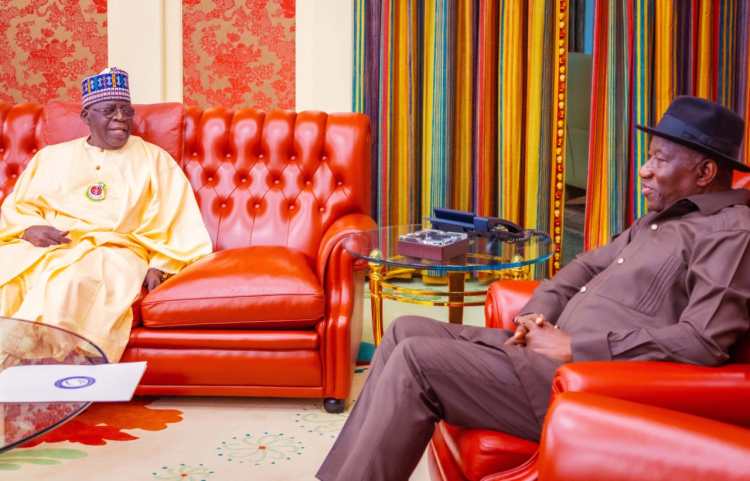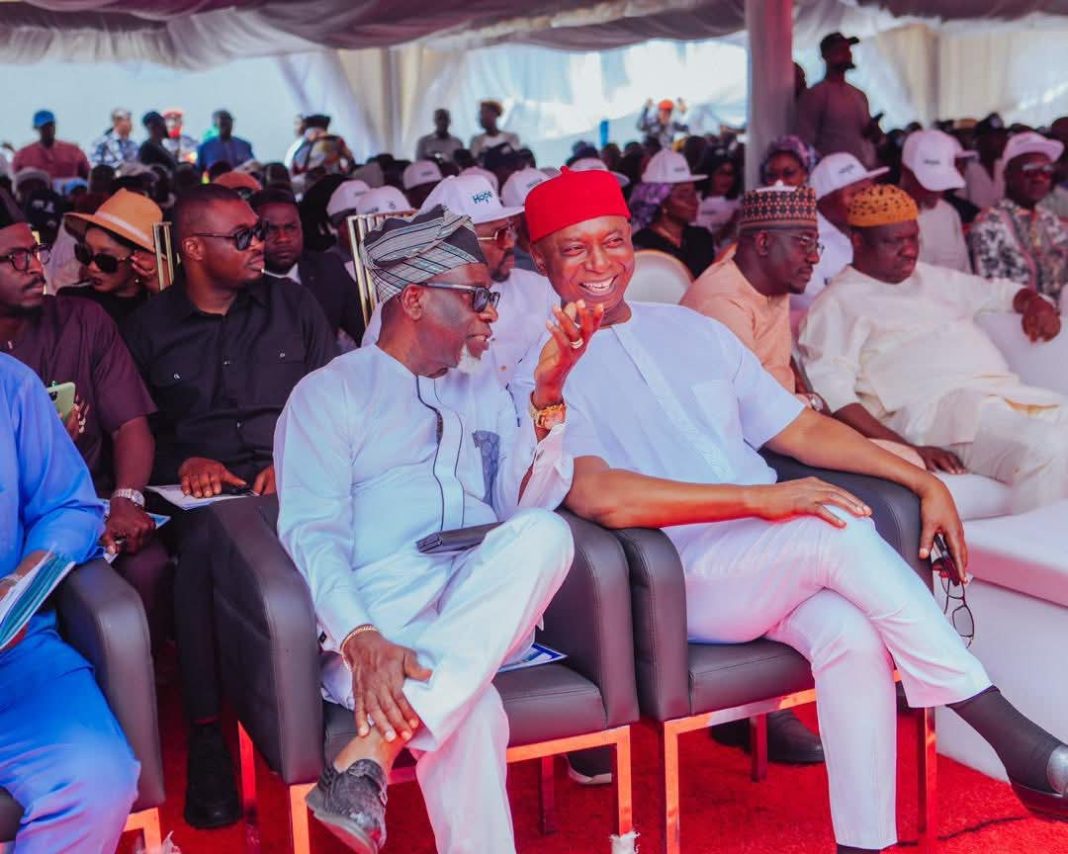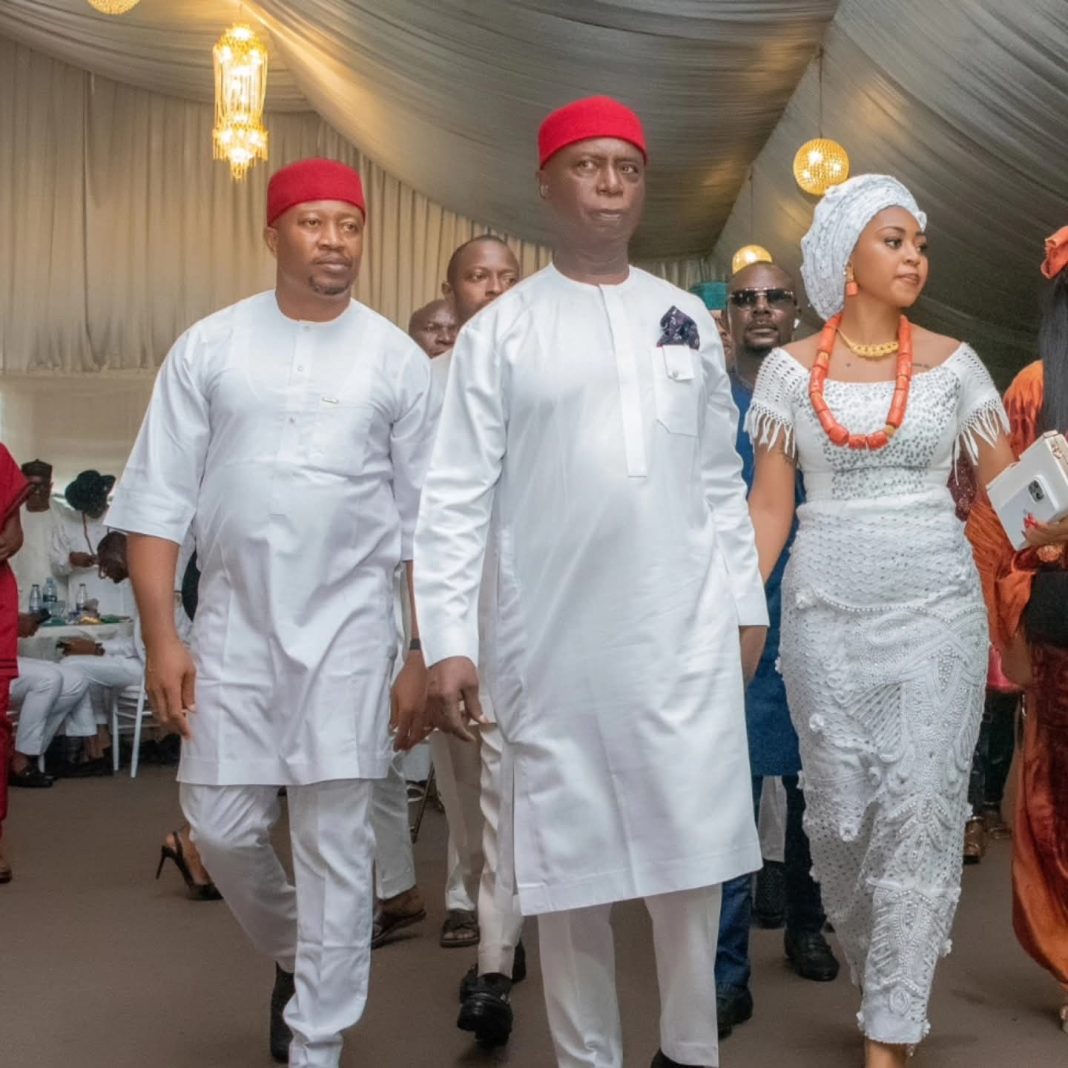Ehichioya Ezomon
AS the ground shifts from under the main opposition Peoples Democratic Party (PDP) – due to exodus of its governors to the ruling All Progressives Congress (APC) – we return to the issue of eligibility of former President Goodluck Jonathan to contest in the 2027 General Election on the PDP ticket.
This time, though, the focus is on President Bola Tinubu – for dabbling in Jonathan’s qualification saga despite recognising his “alienable right to contest for the presidency again” – and Dr Josef Onoh, an ardent supporter of the President and his former campaign spokesman in the South-East, for “telling truth to power.”
(For the record, Josef, a clinical psychologist and entrepreneur, former Enugu State lawmaker and ex-chairman of Enugu Capital Territory Development Authority (ECTDA), is son of the famed Enugu State Governor Christian Chukwuma Onoh (or CC Onoh for short) and brother to Nigeria’s Minister of State for Foreign Affairs, Amb. Bianca Odumegwu-Ojukwu, wife of head of the defunct Republic of Biafra, Lt-Col. (later General) Chukwuemeka Odumegwu-Ojukwu)
The Special Adviser to the President on Information and Strategy, Mr Bayo Onanuga, had claimed in September 2025 that: “The jury will determine whether Jonathan, who was sworn in twice as president, satisfies the constitutional requirements and is eligible to contest the presidency and be sworn in, if successful, for a third term in office,” even as he boasted that, “Jonathan is no match for Tinubu.”
Onanuga’s responding to a September 28 claim by former Minister of Information, Prof. Jerry Gana, that Dr Jonathan would be the PDP candidate in 2027, saying that having seen the performances of two APC’s Presidents since 2015, “Nigerians are now yearning for Jonathan’s return to power.”
“Sworn-in” as president in 2010 after the death of President Umaru Musa Yar’Adua, and in 2011 following his poll victory, legal and political pundits argue that Jonathan’s 2027 bid may infringe the amended 1999 Constitution of Nigeria in Section 137(1)(b) and 137(3) that accordingly limits “election of a President to two terms,” and a single term if the person has “completed the term for which another person was elected as President.”
Tinubu’s joining in the eligibility fray has drawn Onoh into the debate that comes 12 years (2013), and three years (2022) when a similar discourse came up pre-2015 and 2023 elections, and 10 years after Jonathan’s novel peaceful handover of power following his poll defeat in 2015.
To shed light on the issue, Onoh travelled to Yenagoa, Bayelsa State, on September 30, to obtain a Certified True Copy (CTC) of the Federal High Court judgment on Jonathan’s qualification to contest in 2023; and thereafter told reporters that President Tinubu shouldn’t relitigate Jonathan’s suitability, as “it’s a settled matter,” which, advisory, I abridgedly analyse below:
Onoh premises his advisory to Tinubu on several grounds: Court judgments affirming Jonathan’s eligibility to contest in 2015 and 2023; the court rulings weren’t appealed, and litigating same issues afresh breaches the statute of limitations; unappealed judgments are a finality; there must be an end to litigation; Tinubu needs to avoid setting a precedent of reopening a finalised case; and ignore his handlers, listen to his wife’s sincere voice, and focus on the priorities of voters, who’ll determine his second-term bid in 2027.
To Onoh, as The Nation reported on September 30, Jonathan’s eligibility under constitutional term limits “is already a settled legal precedent” that’s established through unchallenged judicial rulings that affirmed his qualification to contest future elections.
“Therefore, President Tinubu should not be deceived by anyone telling him otherwise. This was exactly how Jonathan’s inner cabal, during the build up to 2015 elections, deceived him into believing that he was invisible (invincible), that Nigerians loved him, to the extent he was too carried away that he felt invisible (invincible) and never saw Tinubu coming,” Onoh says.
“Tinubu was the invisible magician that cast the spell that led to Jonathan’s loss at the polls. The President should not fall in the same trap by the voices that surround him now. The one major sincere voice he should listen to is his wife, (as) many will betray him in the coming months,” Onoh adds.
As a reminder, Onoh cites two unappealed court rulings in 2013 and 2022 favouring Jonathan’s eligibility to contest in 2015, and 2023, respectively, which would’ve enabled his second term had he won either of the polls.
Onoh refers to the May 2022 “binding and unappealed judgment” of the Federal High Court in Yenagoa, Bayelsa State (Suit No. FHC/YNG/CS/86/2022), which delivered a “definitive ruling” in a case brought by APC members, Andy Solomon and Ibidiye Abraham, against Jonathan, the APC, and Independent National Electoral Commission (INEC).
According to Onoh, the trial Justice Isa H. Dashen, holding that Jonathan’s constitutionally eligible to contest the presidency of Nigeria again, reasoned that his assumption of office on May 6, 2010, after President Yar’Adua’s death, wasn’t an election under Section 137(1)(b) of the 1999 Constitution, but “a succession to complete Yar’Adua’s unexpired term, invoking the doctrine of necessity and not counting toward the two-term limit for elected mandates.”
Claiming that Jonathan’s elected only once in 2011, and that he didn’t exhaust his constitutional allowance in the 2015 legitimate re-election attempt, Onoh states: “The 2018 constitutional amendment (via the Fourth Alteration Act), which added Section 137(3) to bar anyone sworn in twice from further contests, does not apply retroactively to Jonathan. The amendment postdated his tenures (2010-2015). It cannot retroactively disqualify rights accrued under the pre-amendment framework.”
Onoh notes three germane issues: The impermissibility of ex-post facto laws (a type of law with retroactive consequences) in Nigeria’s constitutional democracy (a principle reinforced by the Court of Appeal’s 2015 ruling in Cyriacus Njoku vs Goodluck Ebele Jonathan (2015) LPELR-24496(CA)); the May 2022 judgment that wasn’t appealed within the 90-day window allowed by the Constitution and relevant electoral laws; and over three years later, “the ruling stands as final and binding under the doctrine of res judicata (Latin for ‘a matter judged’) – barring relitigation of the same issues between the same parties.”
“Hence I urge Mr. President not to listen to anyone who comes to spin him with legal possibilities of Jonathan’s eligibility because Nigerian jurisprudence, including Supreme Court decisions like Marwa vs Nyako (2012) 6 NWLR (Pt. 1296) 200, upholds such precedents to ensure legal certainty and prevent endless challenges to settled rights,” Onoh says.
“With due respect to Mr. Onanuga, his invocation of future court scrutiny, while respectful of judicial authority, ignores this finality due to statute of limitations and finality, hence any hypothetical challenger today would face dismissal for delay, as the core facts (of Jonathan’s oaths and elections) are historical and were adjudicated in 2022,” he adds.
Stating that the Supreme Court has consistently ruled against “stale” claims that could have been appealed timely (e.g. A.G. Federation vs A.G. Abia State (2001) 11 NWLR (Pt. 725) 689); Onoh cites the precedent from the 2013 unappealed Federal High Court ruling (Suit No. FHC/ABJ/CS/231/2013), as per Justice Mudashiru Oniyangi, clearing Jonathan to run in 2015, as forming the bedrock for the 2022 decision.
His words: “This chain of unassailed judgments creates an impregnable legal shield. So, in my opinion, eligibility is a settled constitutional right, not open to political conjecture. I’m aware many critics in the past have framed opposition as a “risk” for parties fielding him (Jonathan) will face a disqualification, acknowledging the unresolved tension with the 2018 amendment, but the 2022 ruling resolves it in Jonathan’s favour.
“In essence, the matter is not pending a “jury” (or judiciary) trial (as Onanuga insinuates); it was conclusively decided. Suggesting otherwise risks undermining judicial authority by implying courts must revisit final verdicts at political whim, eroding the stability essential to Nigeria’s electoral process.”
Addressing Tinubu directly, Onoh declares: “I owe Mr. President the truth before he’s betrayed again by politicians waving successful statistics around him without any knowledge of how Nigerians truly perceive your administration, which isn’t encouraging at the moment but it’s within your powers to change the narratives to your favour.
“To honour the rule of law if Jonathan enters the 2027 race, I advise President Tinubu to engage on visions for economic revival, security, and unity, this elevates the conversation, respecting Jonathan’s cleared path while focusing on voters’ priorities. Nigeria’s democracy thrives when legal finality frees space for ideas, not recycled litigation.”
Will President Tinubu consider Dr Onoh’s intervention, and keep at bay those egging him on to pursue an endless litigation of courts’ finalised eligibility of Dr Jonathan to contest in the 2027 General Election? As an Esan proverb says, “Let’s cook the corn pudding in wait for the market to open.”
* Mr Ezomon, Journalist, writes from Lagos, Nigeria. Can be reached on X, Threads, Facebook and WhatsApp @EhichioyaEzomon. Tel: 08033078357





